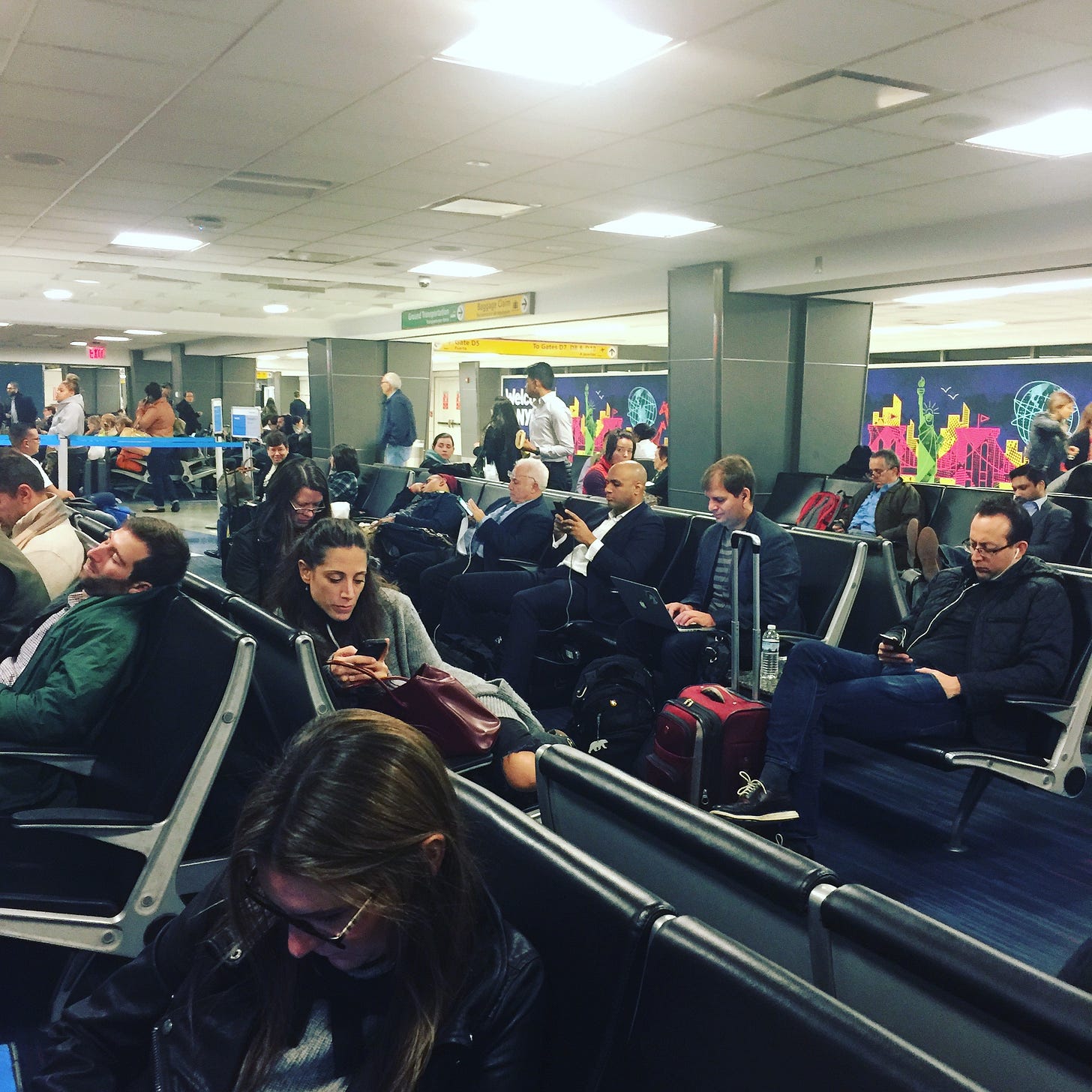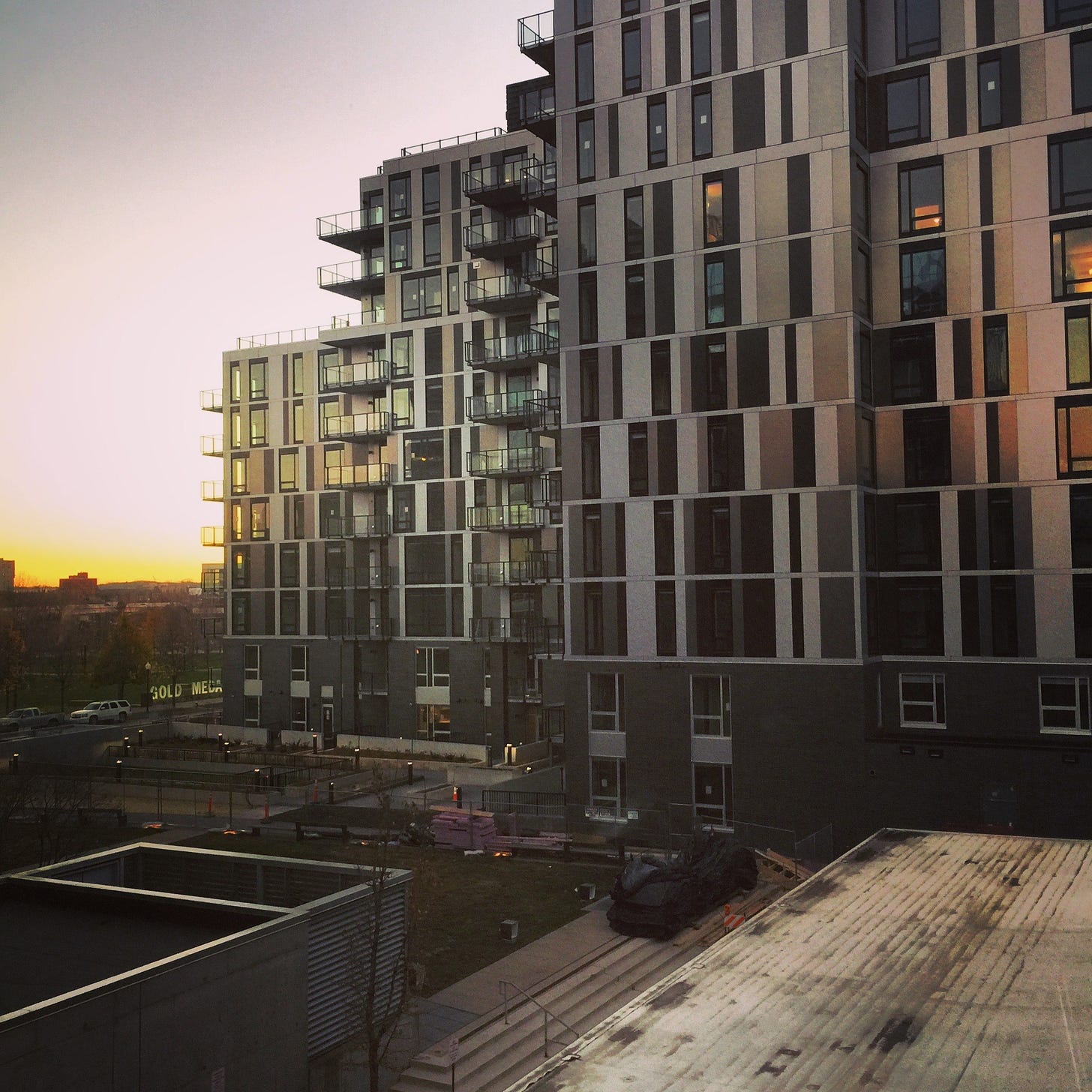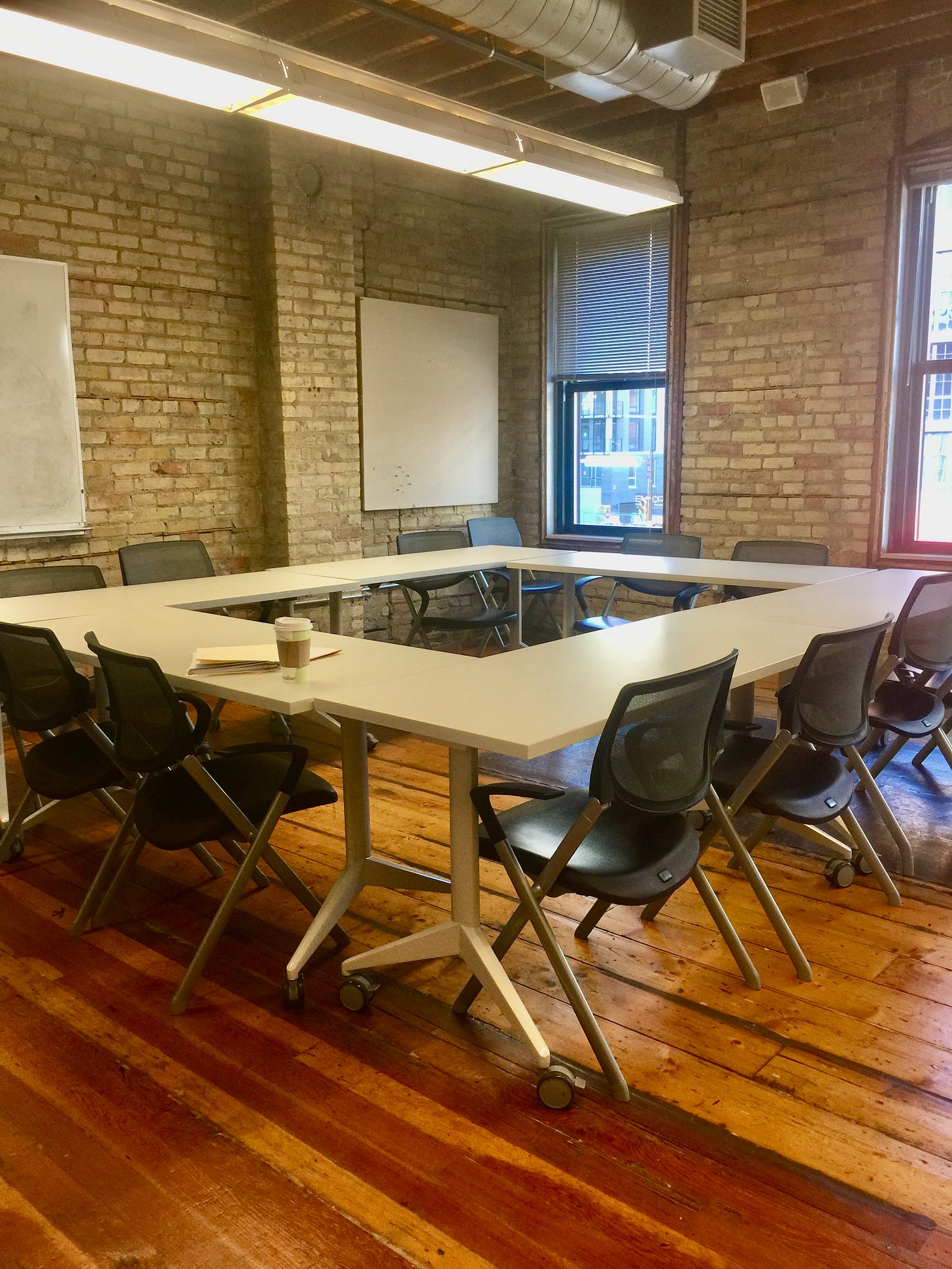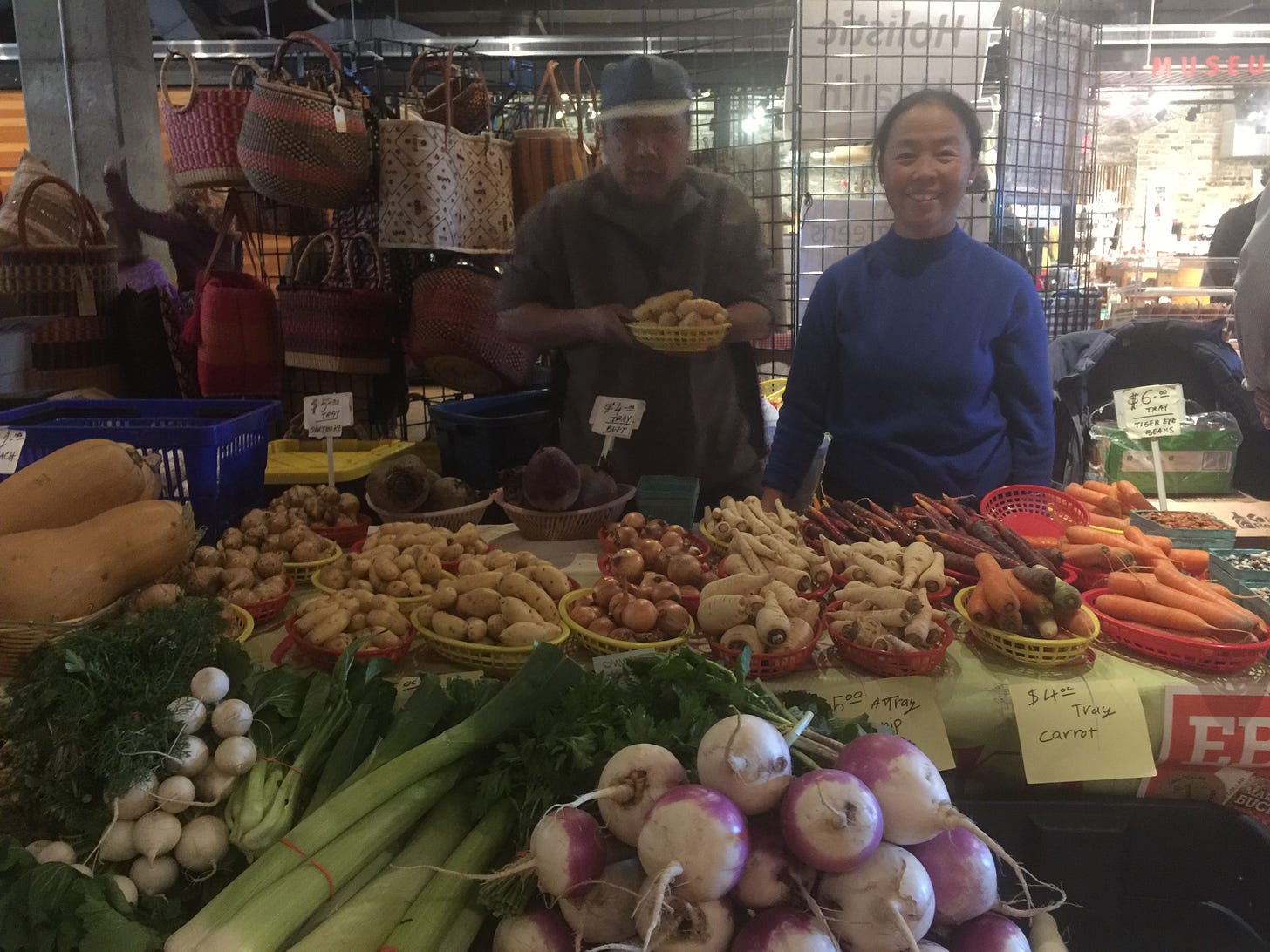I remember it so well, as do many of you.
We all went to bed the night before, tired but relieved. We tucked our babies in; we called our elders. We took the dog out for a last visit to the yard. We kissed our partners and spouses, turned off our lights, and went to sleep certain of safety and, if not safety, at least democracy.
And then we woke the next morning and discovered: we were wrong. The world had been turned upside down, and everything we thought we knew was true — everything that we held as sacrosanct as just part of the fiber of our lives, like, for example, the rule of law — wasn’t. The world had changed, overnight.
At four that morning, a car service picked me up for a pre-dawn flight out of LaGuardia for Minneapolis, where I was spending a few days teaching and reading at The Loft Literary Center. My second book had just come out, and I’d always wanted to teach and to read there. I’d always wanted to see the Mississippi River close enough to toss stones into it, to visit the cold weather farmer’s markets, and walk around St. Paul. I arrived at the airport at five, went through security, and sat at the gate drinking a cup of bad coffee. As a New Yorker, I had flown in and out of LaGuardia on hundreds of occasions, from the time I was a baby visiting family in Florida. It can be a loud, aggressive, obnoxious place to spend an early morning, but on this day, as the sun was beginning to come up, I realized: you could hear a pin drop. People were staring off into the distance, with a combination of exhaustion and shock.
Those of us who are born and raised New Yorkers of a certain age remember T**p from the eighties, saying outrageous, dangerous, provocative things on record, and showing up in New York Magazine in a Playgirl-like spread, reclining in leopard-print underwear (a photo which has since miraculously disappeared). My family had a connection to his: someone I went to high school with worked for him, directly. My uncle, a profoundly honorable man, a captain in the Army Corps of Engineers right after the Allied invasion, eventually became a builder, and there was at least one story of him and my aunt having Fred T**p and his wife and son for dinner, as one used to with one’s competitors in the late fifties. One was a well-known slum lord; the other — my uncle — was not. That the son (who my Nazi-hating uncle declared frightening as a teenager) would ever become president was unthinkable.
That morning at LaGuardia, no one spoke on a cell phone. I don’t recall a lot of announcements being made. We lined up at the gate obediently, like schoolchildren, got on the plane, the plane took off, we landed in Minnesota a few hours later, I checked into my hotel across the street from The Loft, dropped my bags, sat down at the desk, and stared out the window without moving. For five hours. I have no recollection of what I did for dinner, or whether I went for a walk along the river a few blocks away, or when I went to sleep.
My class began the next morning, and as we gathered around the square workshop table, a tall blonde woman came in, took a seat, and said, in a voice just above a whisper, Am I safe here?
I had never met this woman before, nor had the other students, who were all women. We nodded our heads. Yes. You’re safe here. We all knew exactly what she meant.
Later that day, I met a Connecticut neighbor’s son for coffee in the cafe at The Loft. I’d known him since he was in middle school, and here he was, studying entomology as a University of Minnesota graduate student. I’d never known him as an adult, but there we sat, drinking our coffee and our tea, wondering: what are we going to do? We had no answer.
Hatred is emotional fentanyl, and those who deal in it, pushers.
Have you seen the river yet? he asked.
I hadn’t, I said.
You should go for a long walk and get some air, he said, and then he hugged me before leaving to go back to class.
I took his advice: I went back to my hotel room, got my coat, and went out for a long walk. I looked at the river, which was wild and furious — not the muddy Mississippi that looks like a ribbon of flat chocolate milk the way it does on its southern end — and the wind blew and blew, until it blew all of the fear and rage and sorrow out of me, and I was angry crying, with furious, snotty tears streaming down my face. I shook. I was chilled to the bone. I crossed the river and found myself at an immense indoor farmer’s market. It was like any other day. I met two Hmong farmers selling stunning vegetables that I wanted to buy but had no way to cook; we talked and they smiled broadly, explaining what I was looking at since I didn’t recognize a lot of what was displayed in front of me. I bought flowers even though I knew I’d be leaving them in my hotel room since I was going home the next day. I stopped at a tiny shop selling Faribault Mill blankets and bought Susan a striped wool scarf for Christmas. A ceramicist was selling beautiful small handmade mugs — the kind you’d use in midafternoon if it was too late for a big mug of tea — and bought two of them. And then I followed the sound of string band music to a corner of the market, sat down, and listened to an excellent guitarist, fiddler, and banjo player. I must have stayed there for an hour before throwing whatever loose singles I had into the banjo case.
A scarf; mugs made by a local ceramicist; farmers; a string band; flowers. Writing in a notebook on the flight home. The mundane saved me, if only for a few hours.
I’d made a reservation for dinner that night at what was supposed to be an excellent restaurant, knowing that single diners are often seated in (as they say) Siberia, and given lackluster treatment. Dinner was wonderful, I went back to my hotel, packed, and left the next morning. Before I checked out, I left the housekeeper a ten-dollar bill and propped a note up against the ice bucket, which was filled with the flowers I’d bought the day before. Please take them home and enjoy them. I hope they did.
I don’t care if I’m supposed to hate you or you’re supposed to hate me. I was sick the day they taught that in school, so I’m sorry: I never got the message.
Before I got on my flight home, I downloaded my favorite music so I could listen to it on the plane without the benefit of WiFi. I fell asleep with my head resting against the window and was happy to get home and see my tiny family a few hours later.
And so here we are, days before another election that could forever change the face of our democracy, certainly for the rest of my life. Everything that has been fought for, everything that my father and my father-in-law and my uncle fought for, all of the civil rights that scores of people died for, every woman whose God-given right to body autonomy drove her to the front lines of protest: it is all at profound risk. The young man I had coffee with at The Loft back in 2016 transitioned some years ago and is one of the best mothers I know, with two beautiful children. I fear for her safety; I fear for her kids. We are far too heavily invested in our worlds of division and hatred — hatred is emotional fentanyl and those who trade in it, pushers — to see the forest for the trees: that this is all we’ve got. We are all we’ve got. This. We.
Us.
This.
I don’t care if I’m supposed to hate you or you’re supposed to hate me. I was sick the day they taught that in school so I’m sorry: I never got the message.
In Marie Howe’s poem, The Gate, the speaker’s brother, dying of AIDs, holds up his sister’s cheese and mustard sandwich and says This is what you have been waiting for, and she says What? and he says This—holding up my cheese and mustard sandwich. Mundanity. The metaphysical wonder of everyday life and the art that comes from it, amidst the tragedy and trauma and the utterly unthinkable.
Art is private prayer made public.
At moments of sheer sorrow and terror, when I have nothing to cling to but the quiet life I have fashioned for myself by design, I’m reminded of what my late friend Kurt Friese used to say at times like this, rolling his eyes at his own tendency towards what he called the soppy: look for the helpers. Understand the innate and boundless beauty and the stability in the mundane. Make the dinner. Listen to the music. Make the art. Immerse yourself in beauty. This is our human right. No one — no despot, no dictator — can ever, ever take that from you. In Permission, I paraphrase Robert Macfarlane: we are the art-making species. It is what we do. Art is private prayer made public. Poems are written on jail cell walls; whole families, including pets, are depicted in ancient cave drawings; Shostakovich’s Leningrad Symphony was begun by the composer while German bombs were raining down on the Russian city, destroying everything in their path. These are the things that give us agency when nothing else does, that enable us to put one foot in front of the other, that tether us to our mutable humanity and the humanity of others, and, as Moshin Hamid called it, the temporary nature of our being-ness.
In Exit West, Hamid writes from the point of view of his character, Saeed, he prayed fundamentally as a gesture of love for what had gone and would go and could be loved in no other way. When he prayed he touched his parents, who could not otherwise be touched, and he touched a feeling that we are all children who lose our parents, all of us, every man and woman and boy and girl, and we too will all be lost by those who come after us and love us, and this loss unites humanity, unites every human being, the temporary nature of our being-ness, and our shared sorrow, the heartache we each carry and yet too often refuse to acknowledge in one another, and out of this Saeed felt it might be possible, in the face of death, to believe in humanity's potential for building a better world, so he prayed as a lament, as a consolation, and as a hope....
These are, as Mark Doty wrote, the agencies of love and art, and they will save us exactly as much as the howling wind off the Mississippi saved me that day in 2016, when the first brick in the dismantling of The Great Experiment was kicked loose, like a game of Jenga.










I was in Marrakesh, Morocco on that dreadful morning in 2016, at the COP UN Climate change conference. This was one year after the historic Paris agreement, which T**p had vowed to pull the United States out of if elected. He had also vowed to ban Muslims from entering the US. I was with 10 undergraduate students, many of them political science majors. We went to bed confident that all would be well and woke up to a changed world.
My students were shell shocked, almost catatonic. Breakfast at the hotel was silent. We walked to the conference site, where they were followed and harassed by reporters wanting an American point of view. By the end of the day we were all pretending to be Canadians.
I can't believe we are back here, eight years later. My husband is French and can't believe that any of this is happening: the vulgar language, the insults, the lies, the obvious stupidity and incompetence. In France any one of those is immediately disqualifying for political office. And yet half of my fellow citizens are seemingly willing to vote for burning it (The Great Experiment) to the ground.
What a beautiful read and so right on. I remember that day in 2016 - the stunned silence and disbelief. Thank you for reminding me, as I sit in the fear of the possibility of him winning, to have hope in everyday beauty - all that we can control. You are such an amazing writer dear Elissa. Thank you for helping lift me out of this anxiety of waiting — ❤️